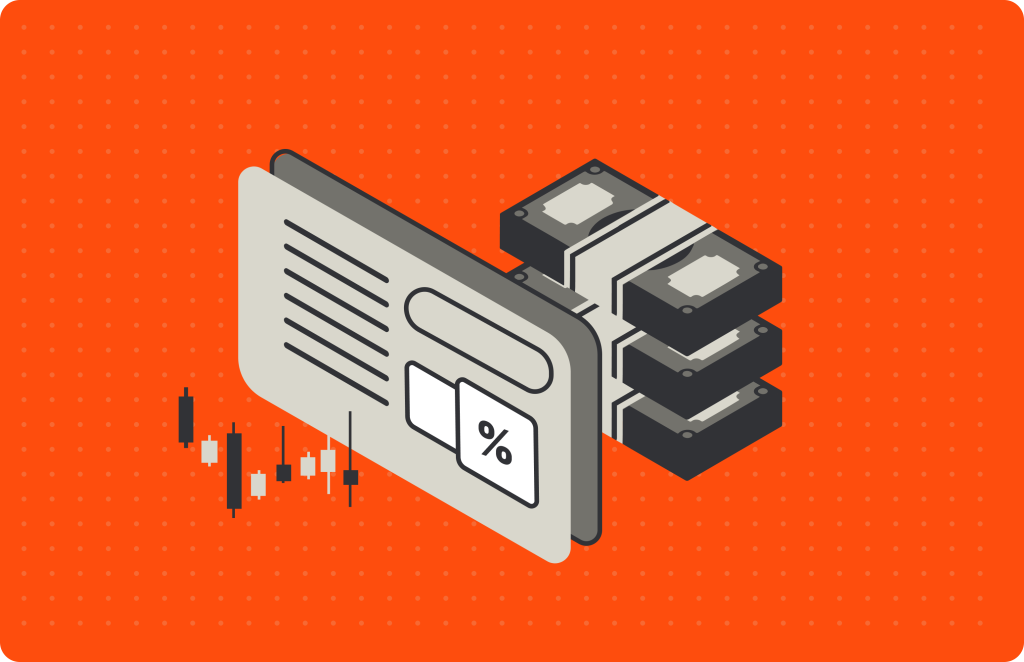Trading
9 minutes read
Apr 1, 2025
OTC Trading – How to Trade Securities Over-the-Counter
OTC (over-the-counter) trading is the process of buying and selling securities less formally, as opposed to being listed on a formal exchange like the NYSE and Nasdaq. In this case, the transaction takes place directly between the buyer and the seller. Usually, this is accomplished through broker-dealers to facilitate the securities transaction. Overall, this creates an opportunity for investors to participate in a broader universe of assets, which include the following:
- Stocks of small and micro-cap companies
- Foreign exchange shares via American Depositary Receipts (ADRs)
- Customized derivatives (forwards, swaps, etc.)
- Currencies and digital currencies
Financial instruments traded over-the-counter (OTC) are less standardized than those traded on the exchange and, consequently, also create greater risk and opportunity. Individuals seeking specialized investments, institutional investors discovering niche opportunities, and high net worth individuals eyeing customized instruments take to designated OTC markets. If you want to diversify your portfolio, traditional exchanges limit you to their offering, and it is beneficial to understand the methodology of OTC markets.
What Makes the OTC Market Unique?
Unlike regular stock exchanges that are centralized with a public order book, an OTC market is entirely decentralized. There isn’t a trading floor, and there is not a central authority that matches orders; there is only a network of broker-dealers to facilitate deals between parties directly. With this flexibility comes lower transparency, fewer reporting standards, and lower liquidity – and, of course, more risk.
Instead of a single platform, OTC trading is supported by a variety of electronic systems, which vary in degree of formality. In the US, the most well-known is the OTC Markets Group, which simply splits companies into three tiers based on financial health and disclosure report levels:
- OTCQX – the top tier, for companies in good standing with strong financials, and full transparency,
- OTCQB – for established companies in the growth phase that are reporting on a regular basis but are not qualified for OTCQX,
- Pink Open Market – the bottom tier, which typically contains distressed companies, inactive companies, or companies without sufficient disclosures.
As OTC trades do not pass through a centralized exchange, broker-dealers play a central role in price discovery, price negotiation, and trade execution. Broker-dealers act as intermediaries, and in an area with fewer rules, their quality and integrity can largely impact the overall outcomes of trading.
Types of OTC-Traded Securities
The OTC market provides access to a diverse range of assets that are not listed on traditional exchanges. These securities are are usually linked to a company or financial instrument that is too small, niche, or new to qualify for a major listing. Here are the primary types you will see:
Micro-Cap and Small-Cap Stocks
Micro-Cap and Small-Cap Stocks These are equity investments in smaller companies – often companies with limited operating history, like start-ups or companies in niche industries – that may choose not to, or may not meet the listing requirements to, list their stock on a major exchange.
- A company may not list its stock to avoid globally high regulatory, acquisition, or fees – or all three.
- Such smaller stocks can be at higher risk than more extensive enterprise stocks, but they offer higher growth potential as well.
American Depositary Receipts (ADRs)
ADR allows U.S. investors to invest in foreign companies without the hassles of dealing with foreign exchanges or currency conversion.
- Represent shares of non-U.S. companies that trade on U.S. exchanges (in U.S. dollars).
- Are a convenient way to diversify internationally.
- Many international blue chip stocks traded on the OTC market as ADRs.
Forex and Cryptocurrencies
The foreign exchange (Forex) market and crypto market are inherently decentralized and almost entirely the OTC market.
- Currencies are traded around the globe, 24 hours a day, directly from one party to another.
- Cryptocurrencies such as Bitcoin and Ethereum are often traded on OTC desks for large orders.
- These markets are moving fast and are liquid but also volatile.
OTC Derivatives
Unlike standardized exchange-traded options or futures, OTC derivatives are bespoke contracts created to meet specific needs.
- These include customizations of swaps, forwards, and options.
- Are often used for hedging or speculation by institutions.
- Carry a significant amount of flexibility in how they’re structured, though they often come with significant counterparty risk.
How to Trade OTC Securities
It may not be overly difficult to trade OTC securities, but you will need to handle it with some discretion. Here’s a simple outline that will take you through the process easily and without confusion:
1. Choose a Reliable Broker
The first, and most critical, step is selecting a broker with direct access to OTC markets. Not all brokers offer OTC execution services, and some brokers only offer limited securities. You will want to go with a broker that has a strong history, does not charge excessive fees, and complies with regulations. You can always ask a broker if they give you access to all 3 OTC tiers (OTCQX, OTCQB, Pink).
2. Research the Security Thoroughly
OTC securities can differ greatly in terms of transparency and risk. Review the company’s financials, any recent news, and disclosures if possible. Make sure you are aware of which tier it trades on; for example, OTCQX companies are generally less risky than Pink unlimited companies. One thing to look for in in stocks that trade as OTC securities are any red flags such as inconsistent filings or lack of public information.
3. Submit Your Order
After deciding on a security, let your broker know and submit an order. Be clear about the specifics, like the number of shares, price range (limit or market order), and time frame. Since OTC prices can change very quickly, having a clear set of terms will allow you to plan for slippage.
4. Wait for Execution
In OTC, trading is not always instantaneous. The broker has to source a counter party to execute the trade, which may take some time, especially if the stock being traded is illiquid. Be patient and be prepared to modify your order if necessary.
5. Monitor Your Investment
Watch the investment after the transactionis complete. Look for information provided by the company, as well as market information as it applies. OTC securities can be volatile market instruments, so you’ll need to check them regularly.
6. Keep in Touch with Your Broker
A good broker will provide you with updates about the status of any orders, or news about the market, or unusual activity. Feel free to ask for input, or clarification, on any concerns you may have.
Risks in Trading OTC
While OTC trading provides distinct investment possibilities, it also entails risks that every investor ought to understand before getting started on these opportunities. Here are a few of the challenges worth keeping in mind:
No Central Oversight
OTC markets have no central exchange or authority overseeing each trade, and the lack of regulation creates the possibility of varied pricing and a lack of transparency. Because of this, investors must be even more careful when verifying the legitimacy of a security and the issuer.
Low Liquidity
Many OTC securities do not trade as often, which can make it more difficult for you to buy or sell at the price you want. You may face higher bid-ask spreads, which can diminish returns. In some instances, there may not be any buyers or sellers at all when you are ready to trade.
Price Fluctuation
OTC stocks may exhibit a high degree of price fluctuation, particularly stocks that have a small market capitalization or are traded little. Prices might swing sharply upward or downward, resulting from little or no trading activity or news that affects these securities. Even a small movement in the price can result in large fluctuations.
Fraud & Misinformation
This is a serious issue, especially in tiered markets, like the Pink Open Market (POM). Some companies may be giving only partial or misleading information and others not reporting at all, putting investors at risk for important scams or pump-and-dumps.
Execution and Counterparty Risk
Since transactions are placed directly between parties, there is always a chance that something goes wrong. Your order might not be filled at the price you would like possibly, and not filled at all. There is also counterparty risk, when the other party fails to deliver or pay.
How to Mitigate Those Risks?
Risk management in the OTC markets starts with comprehensive due diligence. Before investing in anything, you must investigate the company that issued the security. Review its financial statements, read its most recent press releases, consider its regulatory filings with relevant securities authorities, and view any third-party reports if available. If a company fails to disclose enough information or appears evasive, serious concerns should arise. Transparency is essential in OTC markets, where formal regulatory oversight is less prevalent than it would be in listed markets.
Another intelligent way to limit risk is through diversification. Rather than focus all your capital on a single OTC stock or sector, allocate your capital across a mixture of securities. This reduces concentration risk and cushions the impact of any single economic or business loss on the portfolio. Equally important is that investors work with a broker who is experienced in the OTC markets. A knowledgeable broker with access to great platforms, will be more effective at trading, avoid unnecessary costs, and provide insight into the credibility of various securities.
OTC Regulations – Who’s Watching?
While OTC markets may appear to be akin to the Wild West in relation to traditional exchanges, there are still a series of regulatory people regulating the market, though not to the same limit.
- The U.S. Securities and Exchange Commission (SEC) governs parts of the OTC market and enforces basic rules to limit fraud and market manipulation. For example, companies whose shares are on the OTCQX must file periodic reports, if the shares meet certain standards.
- Tier-specific reporting requirements vary:
In general, OTCQX companies adhere to strict governance and transparency norms. OTCQB has fewer stringent rules, but it still needs timely financial reporting. There are no minimum financial requirements for Pink Open Market; some businesses don’t provide any information at all.
- Since no single body is in charge of all trades, overall regulation is less uniform. Many over-the-counter (OTC) transactions take place in private via broker-dealer networks, lacking the control and visibility seen on exchanges like as the Nasdaq.
- Everything still needs to be confirmed by yourself. The quality of a company’s information can differ even when it is officially reporting. It’s your responsibility as an investor to review the documentation, consult reliable sources, and assess a company’s credibility.
To put it briefly, there are regulators in the OTC market, but their limited authority means you need to exercise extra caution. Consider this regulation to be more of a safety net than a promise.
Final Thoughts
OTC trading can be a smart move—but only for the right investor, at the right time, and with the right mindset. Through the OTC market, you can acquire foreign equities and specialty instruments, diversify your portfolio outside conventional assets, and get exposure to up-and-coming businesses. Traditional exchanges just do not provide these kinds of options. Experienced individual traders, wealthy individuals, or institutional investors who are prepared to go deeper and take on more risk in exchange for possible gain may find it to be a reasonable option.
If you choose to enter over-the-counter markets, make sure you do your research, engage with reliable brokers, and keep yourself updated. When combined with a sound plan and discipline, over-the-counter trading can be a useful tool for your overall investing journey.
FAQ
122
Read more

Brokerage Business
10 minutes read
Sep 30, 2025
The brokerage industry in 2026 is entering a new phase shaped by technology, regulation and shifting client demands.



